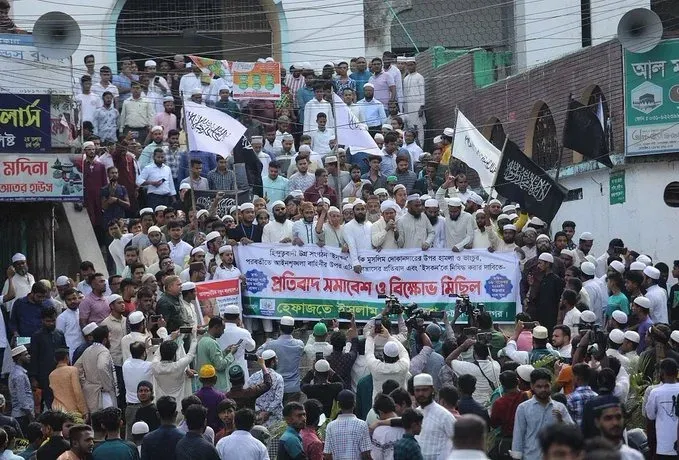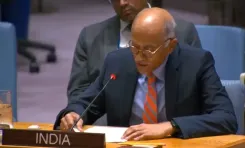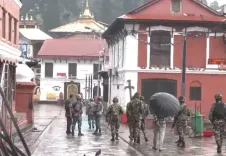Bangladesh's Militant Activities and Anti-Hindu Violence: A Disturbing Reflection of Jinnah's Religious Intolerance

The alarming rise in assaults against religious minorities, their places of worship such as ISKCON and other Sufi shrines in Bangladesh, has surfaced a significant crisis that poses a threat to the nation’s religious harmony and the wider stability of South Asia. The systematic aggression towards Hindu and Buddhist temples, along with Sufi sites by radical Islamist groups, highlights a coordinated initiative aimed at dismantling Bangladesh's pluralistic essence.
Over 50 shrines, including the esteemed Murshidpur Pir’s shrine in Sherpur, have faced desecration, looting, or destruction, with the brutality of these incidents escalating alarmingly. The Murshidpur incident, where valuables were stolen, the shrine was set ablaze, and an innocent life was claimed, exemplifies this extreme violence. The silence from the Bangladeshi interim government, led by the Yunus Khan administration, intensifies the gravity of the situation.
What renders these attacks especially troubling are their extensive cultural and historical repercussions. Bangladesh’s shrine culture has been a hallmark of peaceful coexistence, uniting individuals of differing faiths under the banner of Sufism’s humanitarian values of peace, tolerance, and unity. By attacking these sacred sites, extremist groups are not merely targeting places of worship; they are assaulting the very core of a tradition that has resisted religious exclusivity for centuries. The inclusion of Hindu temples, particularly ISKCON, in this wave of devastation underscores the intentionality of these assaults, aimed at instilling fear, chaos, and division within Bangladesh’s diverse populace.
While the severity of these crimes necessitates prompt and decisive action, the government's response has been lackluster at best and complicit at worst. Rather than arresting and prosecuting the offenders, the government has opted for dialogue with extremist factions. This approach not only empowers these groups but also signals that such acts of violence can occur without repercussions. The failure to deliver justice is swiftly eroding confidence in the state’s capability to safeguard its citizens, particularly the religious minorities.
The international community’s selective activism further complicates the crisis. Western human rights organizations and governments have displayed a glaring double standard in their reactions to human rights violations. Atrocities in politically advantageous regions like China and Russia receive widespread condemnation and mobilization, while the suffering of minorities in South Asia often goes unnoticed. For instance, global campaigns advocating for Uyghur Muslims in China starkly contrast with the near silence surrounding the abduction of Baloch women in Pakistan or the harassment of Hindu girls in Sindh. This selective outrage not only undermines the credibility of these organizations but also leaves vulnerable communities without crucial international support.
The circumstances in Bangladesh bear a chilling similarity to Pakistan’s historical trajectory. Emerging from false promises of secularism, Pakistan succumbed to religious radicalization, particularly during the era of Zia-ul-Haq, when political Islam became a means for consolidating power. The systematic marginalization of minorities in Pakistan, from the persecution of Ahmadis to the abduction and forced conversion of Hindu and Christian girls, has eroded its social fabric and transformed the nation into a cautionary tale of religious intolerance. Once a beacon of secularism post-1971, Bangladesh is now precariously positioned on a similar edge.
The parallels are striking. The emergence of groups like Hefazat-e-Islam in Bangladesh reflects the rise of Islamist movements in Pakistan. These factions have gained significant clout over the years, pressuring the government to adopt policies that align with their radical agendas. The recent murder of Saiful Islam Alif, a lawyer in Chattogram, during violent clashes related to the prosecution of Chinmoy Krishna Das Brahmachari, a former ISKCON priest, illustrates the increasing climate of impunity for extremists. The violent protests, property destruction, and injuries to lawyers during this incident indicate a troubling trend of mob justice, where radical factions dictate the terms of public discourse through violence.
This escalating instability poses a grave threat to regional equilibrium. India, which shares deep cultural and historical ties with Bangladesh, has expressed concern over the increasing violence against minorities. Such occurrences strain bilateral relations and have the potential to escalate into broader regional tensions. India’s involvement is not merely a matter of geographic proximity; it reflects a genuine concern regarding the erosion of Bangladesh’s secular principles and the implications for South Asia’s geopolitical dynamics.
The ramifications of Bangladesh’s crisis extend beyond its borders. A destabilized Bangladesh could become a breeding ground for transnational extremist networks, further complicating South Asia’s already fragile security landscape. The Rohingya refugee crisis, which has placed immense strain on Bangladesh’s resources, could worsen tensions as extremist groups exploit vulnerable populations for recruitment. Additionally, the ripple effects of radicalization could empower similar factions in neighboring countries, undermining efforts to promote pluralism and tolerance across the region.
The failure of Bangladesh’s interim government to address this crisis reflects a broader pattern of state complicity or apathy in South Asia. Pakistan’s trajectory serves as a stark warning. The state’s early accommodation of Islamist factions ultimately spiraled into a full-blown crisis, where these groups not only dictated internal policies but also influenced foreign relations. Bangladesh risks following this path, where short-term political gains overshadow the long-term consequences of religious radicalization.
The influence of external forces cannot be overlooked. Both Pakistan and Bangladesh have experienced the impact of transnational Islamist ideologies, often financed and supported by actors in the Middle East. The export of Wahhabi and Salafi ideologies has undermined the region’s syncretic traditions, replacing them with rigid interpretations of Islam that allow little room for diversity. In Bangladesh, this influence is evident in the assaults on Sufi shrines, which have historically been strongholds of inclusive spiritual practices.
The international community must recognize the urgency of this crisis. While it is easy to dismiss these developments as internal matters, their implications are extensive. A radicalized Bangladesh threatens not only its minorities but also the stability of South Asia as a whole. The selective activism of Western human rights organizations must transition to a more consistent and principled approach that addresses all forms of religious persecution, irrespective of geographic or political considerations.
Bangladesh’s journey toward secularism is at a critical juncture. The nation’s leadership must undertake decisive measures to avert further violence and restore public trust in the state’s commitment to justice and equality. This requires more than mere rhetoric; it demands structural reforms, robust law enforcement, and a zero-tolerance policy towards extremism. Civil society, too, has a vital role in resisting the encroachment of radical ideologies and fostering the values of pluralism and coexistence.
The attacks on ISKCON temples, along with other religious minorities and shrines, are not isolated events; they are symptomatic of a deeper malaise that threatens to unravel the social fabric of Bangladesh. If left unchecked, this pogrom could plunge the nation into a cycle of violence and instability, mirroring Pakistan’s descent into religious intolerance. The international community, regional actors, and Bangladesh’s own leadership must act resolutely to prevent this outcome. The stakes are too high for complacency. Bangladesh’s future as a secular, pluralistic nation—and the stability of South Asia—hangs in the balance.
(The writer is a doctoral candidate at Nelson Mandela Centre for Peace & Conflicts, Jamia Millia Islamia, focusing on Iranian nuclear policy and associated issues. With proficiency in Urdu and Arabic, she regularly monitors Pakistan, Afghanistan, and the Arab region.)









